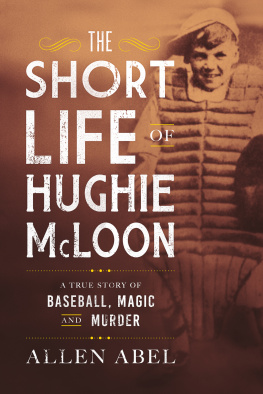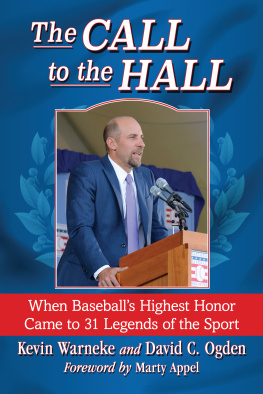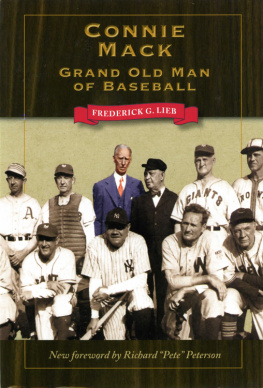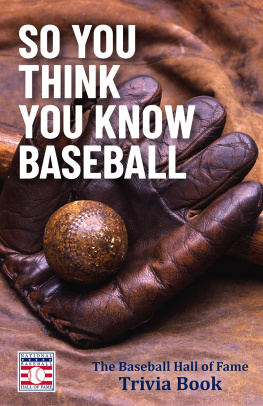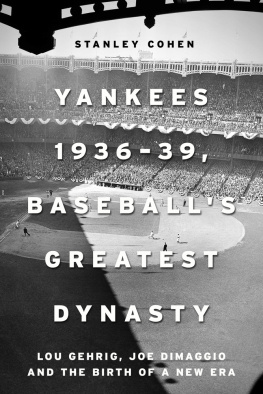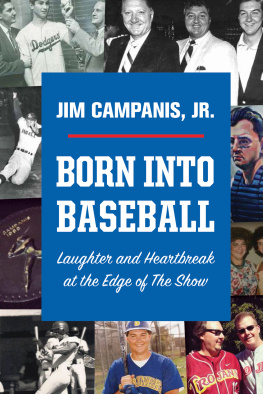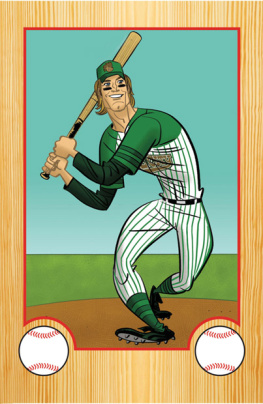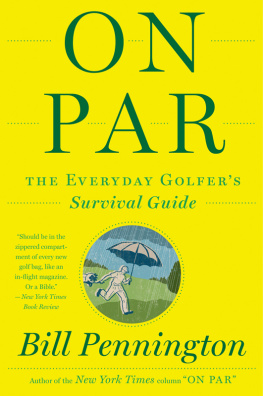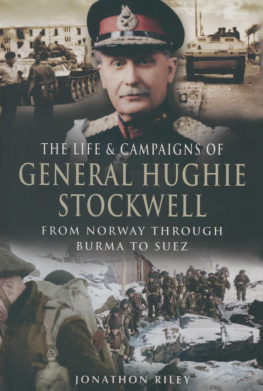

Sutherland House
416 Moore Ave., Suite 205
Toronto, ON M4G 1C9
Copyright 2020 by Allen Abel
All rights reserved, including the right to reproduce this book or
portions thereof in any form whatsoever. For information on rights and
permissions or to request a special discount for bulk purchases, please
contact Sutherland House at
Sutherland House and logo are registered
trademarks of The Sutherland House Inc.
First hardcover edition, June 2020
If you are interested in inviting one of our authors to a live event or
media appearance, please contact
and visit our website at sutherlandhousebooks.com for more
information about our authors and their schedules.
Manufactured in the United States
Cover designed by Lena Yang
Book composed by Karl Hunt
Library and Archives Canada Cataloguing in Publication
Title: The short life of Hughie McLoon: a true story of baseball, magic and murder / Allen Abel.
Names: Abel, Allen J., 1950- author.
Description: Includes index.
Identifiers: Canadiana 20200178792 | ISBN 9781989555309 (hardcover)
Subjects: LCSH: McLoon, Hughie. | LCSH: Philadelphia Athletics (Baseball team) | LCSH: Bat boys
PennsylvaniaPhiladelphiaBiography. | LCSH: Mascots
PennsylvaniaPhiladelphiaBiography. |
LCGFT: Biographies.
Classification: LCC GV865.M378 A24 2020 | DDC 796.357092dc23
ISBN 978-1-989555-30-9
For Lizzie,
who will write
wonderful books someday,
but, hey, no pressure;
for Natasha,
who really likes baseball,
if you can drag her to the stadium;
and for Debbie,
in her Yankees cap,
who has always, always cared.
The deformed man is always conscious that the world does not expect very much from him He becomes extraordinarily sensitive to other peoples first impressions of him. Those who are to be his friends he knows instantly This sensitiveness has both its good and bad sides. It makes friendship that most precious thing in the world.
Randolph Silliman Bourne, The Handicapped
By One of Them, Atlantic Monthly, 1911
Signs, omens, dreams, predictions
Are not all fictions
And many facts does histry cite,
Which show that I am right!
La Mascotte, 1880
I tol him Id bring him luck, an I did!
Hughie McLoon
H UGHIE MCLOON WALKED OUT of the speakeasy at a quarter to two in the morning with a hoodlum on each arm. Here he was, the most recognized and popular little guy in Philadelphiahadnt they asked him to hold up the round cards at the Dempsey-Tunney fight with 130,000 people in the stands?and now he was running his own caf at Tenth and Cuthbert, five short blocks from Independence Hall and the Liberty Bell, and life should have been, as they said in those days, the berries.
McLoon was serving sandwiches, light lunch, and bootleg ale and whisky ladled from buckets secreted behind the counter when two wise guys with names off a Hofbrau menu, Meister and Fries, imposed themselves. They were into their beer even before theyd hauled up and now, more having been applied, they began bragging loudly about things theyd done and girls theyd ravished and people they knew around town. Hughie decided to invite his guests into Philadelphias summer air, lest the scene become more indecorous.
Just then a car, later identified (rather unhelpfully) as a black machine or a big sedan, came busting down Arch Street. It swerved southbound on Tenth, and braked sharply in front of the three men. A gun poking through the left rear window ended the short life of Hughie McLoon.
The date was Thursday, August 9, 1928. Hughie was twenty-six years and nineteen days old. Part of his face and skull were blown away. The morning papers called it an accident. The gunman or gunmen, it was reported and widely accepted, had been aiming for the two ejected customers, low-ranking mugs whom they had been tailing all evening in hopes of a quick assassination, a couple of drinks, some light lunch, and early to bed. It was dark at Tenth and Cuthbert, and Hughie, however famous, however small a target at less than fifty inches and eighty pounds, was collateral damage.
After the shooting, the black machine raced in wild excitement for blocks around and disappeared. A pair of firemen from Engine Company 20, less than fifty yards from the massacre, heard the shots and ran toward the scene. They followed a river of blood down eight steps to the entrance of Devines Shoe Repair. Hughie McLoon, the former mascot of the baseball Athletics, the lucky hunchback who tended the bats, a cripple who basked in the shadow of the strong, the Dapper Dan about town who lived in a heaven of his own construction, the crony of crime-busters and prizefighters and pull hitters and rumrunners alike, the Hughie who loved the spotlight, the Hughie who loved the crowds, was lying there with more than a dozen wounds to the head, face, and body. In the mascots pocket, the firemen found twenty-five cents.
Hughies death wrung from a city inured to underworld violence after eight and a half years of Prohibition an outpouring worthy of the operatic stage. In the circles in which he moved he was known to thousands, the Philadelphia Record grieved. And a tragic end brought the throng closer to him in death than it had ever been in life.
But what of William Meister and Joseph Fries (whose real names, it turned out, were Liko and Belko)? The latter limped away with a slight wound to the calf. It was the second time hed been shot in thirty-two days, and not the last.
Detectives brought Belko/Fries to City Hall and asked their questions, seeking to identify the men in the death car. Yes, I know them, he said, but believe me, Im not going to squeal.
Poor Meister/Liko, meanwhile, having accumulated thirteen shotgun fragments in the legs, groin, and midsection, was deposited under police guard in the Jefferson Hospital at the point of death. A last statement was solicited but the wounded man merely grinned and rolled over. He is not expected to live, prophesied the Philadelphia Evening Bulletin. So dangerous were Meisters wounds that he would cling to life for only thirty more years.
But Hughie was gone. McLoon Called Innocent Victim in Gang War, Philadelphia was told on Saturday morning, quoting police headquarters. The little hunchback had no part in the racket which brews murder as well as booze, avowed the Record.
His body lay in state in a little row house on Shunk Street in South Philly, two blocks off Broad. At least fifteen thousand people shuffled through the August swelter to pay their respects, or just to stare. They saw a twisted, dark-haired little Irishman laid out in evening clothes, with a white aster in his buttonhole. By some magical touch, the papers informed the multitudes who were turned away, the evidences of the gunfire which tore out an eye and bored through his cheeks had been removed.
An incandescent crucifix lit the narrow parlor. A wreath at the head of the bier, one among hundreds sent by the luminaries of American League baseball, Pennsylvania politics, and organized crime, bore the single word: Idol. It was from his mother.
I warned Hughie often not to go into business up there, Elizabeth Palmer McLoon Geatens, a Madonna in black crepe, deposed between sobs, but he always comforted me by saying he was well able to take care of himself. He was always so good to me.
Next page
